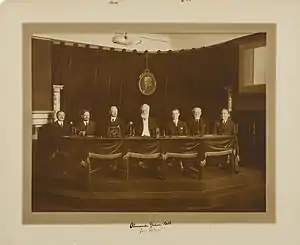First transcontinental telephone call
A telephone call, which for marketing purposes is claimed to be the first transcontinental telephone call, occurred on January 25, 1915, a day timed to coincide with the Panama–Pacific International Exposition celebrations. However, the transcontinental telephone line was first completed on June 17, 1914, and successfully first voice tested in July 1914. A 1998 U.S. postage stamp commemorates the completion of the line in 1914.[1][2][3][4]

Background
The original long-distance telephone network actually started in 1885, in New York City. By 1892 this line reached Chicago. After introducing loading coils in 1899, the long-distance line continued west, and by 1911 it reached Denver, Colorado. The president of AT&T, Theodore Vail, committed the company to a transcontinental line in 1909.
On June 17, 1914, after affixing 4,750 miles (7,640 km) of telephone line, workers raised the final pole at Wendover, Utah, actually on the border between Nevada and Utah state lines. Then, Theodore Vail, the president of AT&T, succeeded in transmitting his voice across the continental U.S. in July 1914.
Six months later, amidst the celebrations surrounding the Panama–Pacific International Exposition, on January 25, 1915, Alexander Graham Bell, in New York City, repeated his famous statement "Mr. Watson, come here. I want you," into the telephone, which was heard by his assistant Dr. Watson in San Francisco, for a long-distance call of 3,400 miles (5,500 km). Dr. Watson replied, "It will take me five days to get there now!" The Alexander Graham Bell call officially initiated AT&T's transcontinental service.[1][2][3][4] The phone call was merely symbolic. Dr. Watson was at 333 Grant Avenue in San Francisco to receive the call, placed by Bell from the Telephone Building at 15 Dey Street in New York City. President Woodrow Wilson and the mayors of both cities were also involved in the call.
Later, President Woodrow Wilson spoke to an audience in San Francisco from the White House and is quoted as saying "It appeals to the imagination to speak across the continent."[1][2][3][4] However, President Wilson was concerned with the "devaluation of the individual" as AT&T celebrated the achievement of the company rather than distinguishing individual inventors, contributors, and innovators.
References
- Riordan, Michael; Hoddeson, Lillian (December 1998). Crystal Fire: The Birth of the Information Age. Sloan Technology Series (1st ed.). New York: W. W. Norton & Company. pp. 57–61. ISBN 978-0-393-31851-7. LCCN 96047464. OCLC 35762766.
- "1915: First Transcontinental Telephone Call" (web page). AT&T Labs. 2013-06-29. Retrieved 2013-08-21.
- "A Transcontinental Telephone Line: July 1914" (web page). PBS online, ScienCentral Inc. and The American Institute of Physics. 1999. Retrieved 2013-08-21.
- McMaster, Susan E. (2002-08-30). The Telecommunications Industry. Emerging Industries in the United States (1st ed.). Westport, Conn.: Greenwood Press. pp. 46–47. ISBN 978-0-313-31601-2. LCCN 2002021628. OCLC 231966417.
External links
- "Mr. Watson -- come here!" Library of Congress. July 27, 2010.
- "Phone to Pacific From the Atlantic". New York Times (reproduced article). January 26, 1915.
- "Across the Continent by Telephone". Scientific American. 112: 129. 6 Feb 1915. doi:10.1038/scientificamerican02061915-129. Retrieved 9 October 2015.
- American Telephone and Telegraph Company (1915). The story of a great achievement. New York: Bartlett-Orr press. Retrieved 9 October 2015.